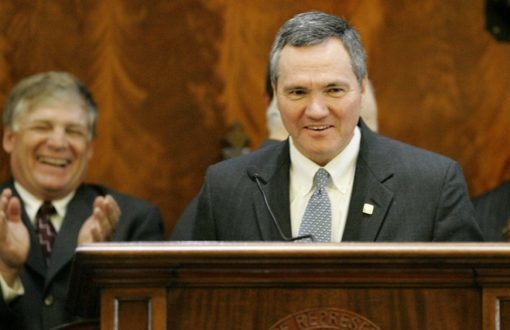
By RICK BRUNDRETT
The special prosecutor assigned to investigate legislative corruption won’t seek the public release of the long-closed file on the former S.C. House speaker whose case launched the State House probe, according to an attorney representing news media in South Carolina.
The State Law Enforcement Division, which assisted special prosecutor David Pascoe, denied four open-records requests this year by The Nerve to release its investigative file on ex-Rep. Bobby Harrell, a Charleston County Republican who had served as the House speaker for more than nine years before his guilty plea in 2014 to ethics violations.
In its last denial, a SLED spokesman told The Nerve that after conferring with Pascoe, the agency determined the Harrell file was “confidential” under the state grand jury law.
Generally, investigative files in closed criminal cases are considered public records, excluding certain legally allowed exemptions, according to spokespersons at several police agencies surveyed this week by The Nerve.
After The Nerve in October reported about SLED’s denial of the state Freedom of Information Act requests, Jay Bender, the longtime attorney for the South Carolina Press Association, of which The Nerve is an associate member, said he would discuss the matter with Pascoe.
Bender last week informed The Nerve that Pascoe doesn’t believe that Harrell’s file can be released under the state grand jury law.
“There isn’t much he can do,” Bender said. “There is state law and, frankly, 200 years of precedent to keep grand jury matters secret except in extraordinary circumstances,” he said, adding, “I think this legislative corruption case report was an exceptional circumstance.”
Bender was referring to a state grand jury report into legislative corruption that Pascoe convinced Circuit Judge Clifton Newman – the presiding judge of the state grand jury – to release in October. In a related matter earlier this month, Pascoe filed a motion with Newman asking that blacked-out portions of the report be made public.
As has been his practice with The Nerve, Pascoe, a Democrat who is the 1st Circuit solicitor for Orangeburg, Calhoun and Dorchester counties, did not return a call this week seeking comment on the Harrell file. He was appointed to the case in July 2014 after Republican Attorney General Alan Wilson recused himself.
The Nerve has previously pointed out that Harrell – arguably the state’s most powerful lawmaker at the time – was indicted by a Richland County grand jury, not the state grand jury; and that the state grand jury report included exhibits of testimony and other grand jury evidence not related to the Harrell case – which normally are kept secret from the public.
Under state law, if the “court orders disclosure of matters occurring before a state grand jury, the disclosure must be made in that manner, at that time, and under those conditions as the court directs.”
The state grand jury report included, though it didn’t focus on, a separate summary report by SLED of the agency’s investigation into a formal ethics complaint filed in 2013 by the South Carolina Policy Council, the parent organization of The Nerve, against Harrell with the S.C. Attorney General’s Office. The Nerve this year sought the entire investigative file on the Harrell case to learn more about how SLED investigators dealt with Harrell’s:
- Use of his private airplane. Harrell pleaded guilty to six misdemeanor counts of using campaign funds to reimburse himself for expenses related to his plane;
- Dealings with the state Board of Pharmacy on various matters involving his pharmaceutical business;
- Appointment of his brother, John Harrell, to the state Judicial Merit Selection Commission, which nominates judicial candidates for election in the Legislature;
- Connection to the Palmetto Leadership Council, a legislative political action committee; and
- Record keeping of campaign expenditures and reimbursements.
The state FOIA allows police files to be kept secret if their disclosure would “interfere with a prospective law enforcement proceeding.” It also allows certain redactions in released reports, such as to protect the identity of confidential informants.
In Harrell’s case, The Nerve sought SLED’s entire investigative file after he had finished his three years’ probation, though SLED said in initial responses earlier this year that it had “an active and ongoing investigation into this matter at this time.” The FOIA requests were narrowly tailored to exclude records relating to any pending investigations outside of Harrell, who resigned from office in October 2014 with his guilty plea.
“The rationale for the whole law enforcement exemption pretty much disappears completely once a case is concluded, said Adam Marshall, a lawyer with the Washington, D.C.-based Reporters Committee for Freedom of the Press, when contacted Monday by The Nerve. “The way to deal with anything else is through redactions and not through wholesale withholdings.”
At the Charleston and Greenville county sheriff’s offices and the Columbia Police Department, detective reports generally are considered public records – subject to redactions allowed under state or federal laws – after the cases are closed, department spokespersons said this week in emails to The Nerve.
“Our case file for an incident in which the defendant has been charged, adjudicated, waived all appeals, and completed his sentence would be subject to disclosure,” minus any legally allowed redactions, said Greenville County Sheriff’s Lt. Ryan Flood.
SLED – considered the state’s lead investigative agency – in the past has publicly released its closed case files under certain circumstances, such as officer-involved shootings it investigated.
Brundrett is the news editor of The Nerve (www.thenerve.org). Contact him at 803-254-4411 or rick@thenerve.org. Follow him on Twitter @RickBrundrett. Follow The Nerve on Facebook and Twitter @thenervesc.
Nerve stories are free to reprint and repost with permission by and credit to The Nerve.
